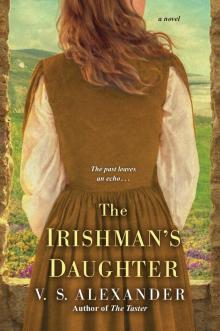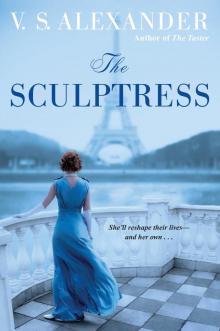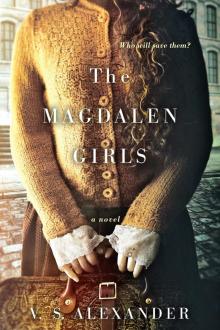- Home
- V. S. Alexander
The Irishman's Daughter Page 36
The Irishman's Daughter Read online
Page 36
Orange outlined his plans for the goods while sitting on the damp plank of a canoe as the men ate plundered meat and cheese. His once-ruddy complexion had faded to ashen with the pain of his injury. Although no doctor, Rory worried an affliction might strike down the large man because of the wound’s proximity to his heart.
“We’ll take the canoes north until we reach the shore near Glencastle. We can’t risk suspicion from the Constabulary at Belmullet. Those of you going that way can make arrangements for what you need. The rest will be stored and buried at the farm near Geesala.” He paused, placed his thick right hand over the wound on his left shoulder, and grimaced in pain. Orange sputtered a bit and then continued, “The silver we’ll convert to cash when we can sell it safely, and we’ll use that money to buy food in any way we can. Every man will get his fair share either at Glencastle or Geesala. Each of you will get rations of meat and cheese. But for now, we must let the goods remain in hiding for a few days. Anyone who believes he’s entitled to more and sets out to get it will pay the price.” He waved his pistol and pointed to the still smoldering fires. “Clear the grounds and let’s be off before the English send the dogs after us.”
The men scurried about, dousing fires, obliterating footprints as best they could, and gathering belongings so that few traces of their presence remained. Three hours past dawn, Rory and Connor watched as the men shoved off and headed north over the slate-colored waves of Blacksod Bay.
Rory wrapped the blanket he had slept in around his shoulders and secured it at the waist, his shirt gone to bind Orange’s wound.
He, Connor, and eight men dragged the heavy sacks across the muddy heath for more than an hour until they arrived at the farm. The sympathizer, a bearded old man named Coyle, gave them water and then muttered and stomped around his stone barn, the hiding place for the stolen goods. He and Connor supervised the placement of the grain sacks under the barn’s hay ricks while the divided silver pieces were buried outside in a box near a tussock.
After their tasks were complete, Rory headed out with Connor after telling Mr. Coyle that he would return with his father for grain in a day or two. Connor left him at the crossing of a small stream to continue on to his family in Bangor after pledging to return for his share of the grain and money. They said good-bye and wished each other luck.
Rory headed across the heath as the wind freshened from the bay. Streams of silvery clouds pelted him with bursts of rain. He was soaked to the skin when he arrived early in the afternoon at the cottage near Ballycroy.
He called out for Brian, but there was no answer.
He stepped inside the gloomy cottage. The smell of roasted meat filled the room, but the odor was gamier than pork or beef.
Brian lay against the wall, his back to the door. Rory didn’t know whether he was dead or alive. A spit of wood hung between two branches over the smoldering turf pit. On it were the remains of a rat and a bird skewered head to tail. They had been partially eaten.
“Brian,” Rory called out in a panic.
The man stirred, gazing up at him with fear in his watery eyes, and then rolled toward the pit. He muttered and thrust out his scrawny arms.
He couldn’t understand his father-in-law’s mumbled words, so he cradled Brian’s head in his arms. The man’s mouth opened and closed in shallow breaths.
Rory kissed Brian’s forehead and cried out, “Don’t die. Please, don’t die.”
* * *
Sir Thomas sat at the oak desk in his library reading the document brought by his solicitor, who was seated across from him. The rain pelted the window behind him in pearly drops and ran down the panes in streaks like silvery shoals of fish. The fireplace crackled on the north wall, penetrating the crepuscular light provided by the weather. As usual, a brandy glass rested not far from his right hand.
The solicitor, a man of upper-class means who dressed the part in stiff breeches and a satin waistcoat, stared at Sir Thomas with a pinched expression. The man knew better than to interrupt while his client was reading an important contract.
The last page seemed so much gibberish that Sir Thomas skimmed through it before lifting his pen. Before he signed, he said, “All appears well. Can you guarantee it?”
“Certainly, sir.” The man bowed his head in an obsequious gesture. “All you need do is sign your name.”
“The sheep will be delivered on time?”
“By April of next year, after the worst of the winter but hopefully before the spring lambs are calved.” The solicitor smiled. “That way the estate can take advantage of extra stock, for our contract is for fifty of the beasts.”
“And the men who will oversee this business have been hired?”
“Yes, sir.” He tapped his fingertips against one another. “I’m assured that the two men are fine representatives of the business. Your agent—I forget the name—has been released and will not be part of this.” It was as much a question as a statement.
Sir Thomas stared at the solicitor. Their kind was puffed up but necessary. He had often wondered whether he could trust the man, who seemed to sense this thought and leaned forward in his chair anticipating a question.
“Brian Walsh—he is no longer under my employ.”
“Then everything should be settled.” The man tipped his glasses back on his nose and folded his hands.
Sir Thomas dashed off his signature, sealed the document, and handed it back to the solicitor, who placed it in his valise. He rose from his chair and said, “The first payment, according to the contract, is due within a week, the second upon delivery of the animals to the estate in Ireland.”
“You shall have it.” Sir Thomas rang the small bell on his desk. His valet appeared almost immediately to escort the man to the door.
He turned his chair toward the fire so he could watch the flames and, to his right, the rain as it drenched the house. Shortly, the solicitor’s coach disappeared down the drive into a foggy torrent. He was alone in the library again with only his man and the housekeeper for company, and they, on these depressing fall days, were not much help in lifting his mood. They were, after all, only servants—as expendable as everyone else in his life.
A sharp pang stabbed his heart, and he likened it to the sadness he sometimes felt when he was a child while still in the company of his mother and father. But he had no right to be sad, he told himself. He had everything a man could want—except for the love of a woman.
His thoughts turned again to Briana. Every day he shut her out of his mind, but the concentration, the effort to rid her from his thoughts, only worsened the problem. She appeared before him when she was least wanted or expected, often dressed in fine silks, Parisian shoes, and powdered face, looking more lovely than any woman should dare.
He, alone, could lift her from poverty, if only she would accept his offer. The Walsh family, and the beggar of a husband, had nothing to offer. Why is she stubborn? Why won’t she listen to reason? The loneliness, the emptiness of his grand life, shattered him. Not even his mistresses could force her from his mind. Could it be I have no concept of love? His parents were strict disciplinarians, and although they touted their love for him he rarely felt it in his mother’s cold kisses and his father’s unemotional handshakes. A few women had professed their love for him, but the feeling he got was one of anxious fawning for his riches rather than any true affection.
He rang for his valet again, and when the man arrived he ordered, “Gather my coat and bring the carriage around. I’m going into the city.” The man bowed and turned away.
Soon the carriage was at the front door, his man holding the umbrella over his head as he escorted him down the walk. “I’ll be dining at home tonight,” he told the valet. The carriage door closed. He raised the shade, settled in the leather seat, and watched the dripping landscape roll by.
Sir Thomas knew where the carriage was headed, and the driver did as well. They had both traveled many times to a grimy stone building near the banks of the River Irwell. Th
ere he would take comfort in the arms of a particular woman, one of the many who worked there. His chosen lady would rid his mind of Briana at least temporarily, along with his worries of what might become of Lear House if the grazing scheme failed.
That afternoon, as he lay with the woman and ran his tongue over her powdered neck, he saw Briana again and knew he must make a trip to Ireland in the spring to see how Lear House was faring. Perhaps, if he was lucky, she would be there.
* * *
Rory spent the evening attempting to feed his father-in-law from the plundered rations and drying his damp clothes. Brian was in no condition to make an arduous trip on the turf ponies to a city where there might not even be a bed.
He threw out the rat but kept the bird, which had been partially eaten. With a trembling hand, Brian pushed away the small portions of cheese and meat from the rations Rory had carried.
The fire needed peat for fuel. After it was stoked, he gathered fresh water, boiled it, and washed Brian’s body with a dry swatch cut from the blanket he’d worn.
He had been away only for one night. His father-in-law had declined so much in twenty-four hours, something must have gone wrong. Maybe the meat had been bad; or worse, perhaps he had contracted the fever. Brian was too weak to talk, however, so any discussion would have to wait.
He went to sleep that night with the blanket covering both of them and the pistol at his side. His sleep was fitful because the ghosts of Frankie and Aideen never seemed far away, staring through the window, peering out from the flames.
The sun broke through the clouds the next morning with intermittent splashes of light on the green heath. Rory was happy to see that the rain had moved on, although the wind cut in from the bay and the sharp air bit at his exposed chest. He washed in the clear rivulet behind the house. Although the Kilbanes’ bodies had long been removed by the Constabulary, the bath sent chills down his back, and not just from the cold water. He imagined the bodies looking up at him with staring eyes from the spot in the bog where he had placed them.
He was eager to depart the crumbling cabin. His body sagged from exhaustion, yet his limbs had been jolted by the cold. Rubbing his arms, he hurried inside and stoked the fire.
Brian stirred, lifted his head, and gazed at Rory with the look of one who has awakened from a long sleep. A spot of color had returned to his cheeks, but despite that good sign, deep lines cut into his cheeks like furrows, his sunken cheeks as hollow as a cave.
“You’re back,” Brian whispered.
“Yes, I’ve been back since late yesterday afternoon. Don’t you remember?” He offered Brian the now-cooled boiled water he had transferred to the flagons. The water slid out of the tip above the man’s lips and dribbled down his chin.
Brian brushed the water away. “I don’t remember anything after supper on the night you left. I ate some of the mush—the pain turned my stomach, and I felt light-headed like I was walking in a dream.”
Rory drew back the blanket and looked at his father-in-law’s breeches. “You need to wash off. I’ll scrub your breeches and dry them out. You can wrap up in the blanket until then.”
“You don’t have a shirt,” Brian said.
“It’s a long story,” Rory said. “I’ll tell you later. Eat some of this meat and cheese, if you can.”
Brian nodded, his sorrowful eyes taking in the cabin.
Rory agreed it was a sad sight—the empty rooms, the split thatched roof in back that let in the wind and rain, the house stripped to its sod and stone walls.
“I want to go home,” his father-in-law said abruptly.
Rory knelt before him. “We were going to Westport to look for work.” He felt as if he were talking to a child.
“I want to go home. I want to be near my wife.”
“We have no home,” Rory said, and remembered the stones that marked the communal graveyard at Carrowteige. There, Brian’s wife was buried. He didn’t want to hurt the man, but he needed to be reminded that there was nothing to go home to.
“Yes, we do,” Brian insisted. He took a piece of cheese, placed it on his tongue, chewed, and swallowed. “Lear House.”
“We’ll be arrested,” Rory said, thinking his father-in-law had lost his mind.
“Not if they don’t know we’re there.” Brian rose and propped his back against the wall, moaning in the process that all his joints ached from his illness. “The house will save us—it must,” he said after he caught his breath.
Rory thought for a moment while holding his tongue. Lear House was a more comforting option than trying to find work in Westport—if jobs were available at all. There would be furniture, blankets, towels, and shelter. It was an easy enough task to break in. The more he thought about it, the more he liked the idea.
Because of the early nightfall, they could light fires in the kitchen, when the smoke wouldn’t be seen, and he could cook the meals he had earned through the raid. There might even be clothes to wear, courtesy of Sir Thomas. They were about the same size, although he was broader at the shoulders. The Master wouldn’t show his face until the spring at the earliest. They might have to dodge the Constabulary, but if they kept their eyes and ears open, they could make a go of it.
“I’ll consider it,” Rory said, trying not to give in immediately. “You need to rest until you’re well enough to travel.”
“Tomorrow,” Brian replied, “I’m going back whether you do or not.” He smiled at Rory, and the decision was made.
CHAPTER 21
December 1846
Not one district officer had come to question Briana about Addy Gallagher’s death since the sergeant had taken the money. Lucinda convinced her that avoiding the police was wise, especially since she could offer no evidence other than Addy’s enigmatic words as she was dying. Only one time in the past month had she seen Romero Esperanza, and that was far down Charles Street as he darted into a building. He appeared not to notice her.
Her pregnancy made it hard to venture about. As it turned out, there were plenty of Irish where she now lived. Much of the time she took a carriage to work, particularly when the weather was sloppy. Lucinda accompanied her when she could.
October slipped into November and then early December, and she and Lucinda settled into a routine at the Colemans’. Their days were spent at work—Briana at the Building Trades, Lucinda with the Carlisles. Mrs. Coleman watched over Quinlin while her husband and the women were at work. True to his developing spirit, the boy moved to the third floor in mid-November, calling the space among the boxes and crates his own special place. Briana granted him permission on the condition that he study English and whatever else Mrs. Coleman saw fit to teach him.
After workdays, everyone savored happy evenings in the kitchen with generous servings of meat, potatoes, and vegetables, much of it provided to Declan through the generosity of Mr. Peters. These suppers were bittersweet because they reminded her how much she wanted a home for Rory and her growing family.
By mid-December, pine and evergreen boughs appeared on doors and in shop windows. Her thoughts turned to Christmas. Briana had written several letters to Rory indicating their new address at the Colemans’ but decided not to mention Addy Gallagher’s death, the boy, or the attack upon her sister. Those developments would be an additional burden upon him in an already trying time. She preferred to keep an optimistic outlook.
The postmaster had no idea when her letters might arrive in Ireland. Any sailings, now that winter was on the horizon, might not be until late March at the earliest. Also, she addressed them, as planned, to Rory Caulfield, Lear House. Where her husband and father might be was unknown to her. She took the chance that they might be delivered to the general store if the manor was deserted.
Rather than lighten her spirits, the holiday dragged her down with memories of Christmases past when the family was together at the estate. It was all she could do to concentrate on her work and to keep her mood lifted when everyone was gathered for supper. As the winds deepened in
Boston to a cold she never thought possible, she wondered if she would ever see her husband and father alive again. What if Rory and Brian never had the chance to see the child she carried? How could she live with herself if they . . . ? It was too distressing to think about.
Those were the dark questions that occupied her mind the evening of December fifteenth as she climbed the drafty stairs to the second floor. She opened and closed the door quickly to keep out the wind sweeping up the hallway. Flames flickered in the fireplace, but the pleasing warmth didn’t alleviate her innate sadness. Outside, a light snow coated the brick buildings and window frames a frosty white. She shivered, dressed in her nightclothes, and crawled into bed.
Lucinda came into the room a few minutes later. “You don’t look well, sister,” she remarked, and drew close to her bedside. She put her hand on Briana’s forehead and then took it away. “You’re burning up. I don’t think it’s wise for you to work tomorrow in this weather.” She looked out the window. “And it may get worse.”
Briana drew the two blankets on her bed up to her neck. Her bones ached, her joints hurt, her stomach rolled with a queasiness she hadn’t experienced since the voyage to Boston, and her nose felt stuffy.
Lucinda lit the oil lamp on the desk and took out a sheet of paper and pen. She began to write as Briana shivered in bed.
Intrigued by her sister, Briana forced herself to ask through chattering teeth, “What are you doing?”
“I’m composing a letter to Father,” Lucinda explained, and then turned back to writing.

 The Irishman's Daughter
The Irishman's Daughter The Sculptress
The Sculptress The Taster
The Taster Her Hidden Life
Her Hidden Life The Magdalen Girls
The Magdalen Girls